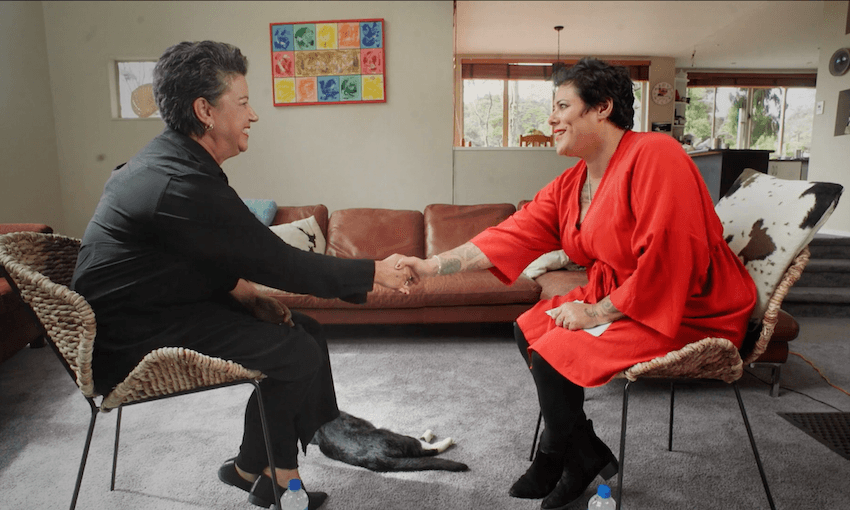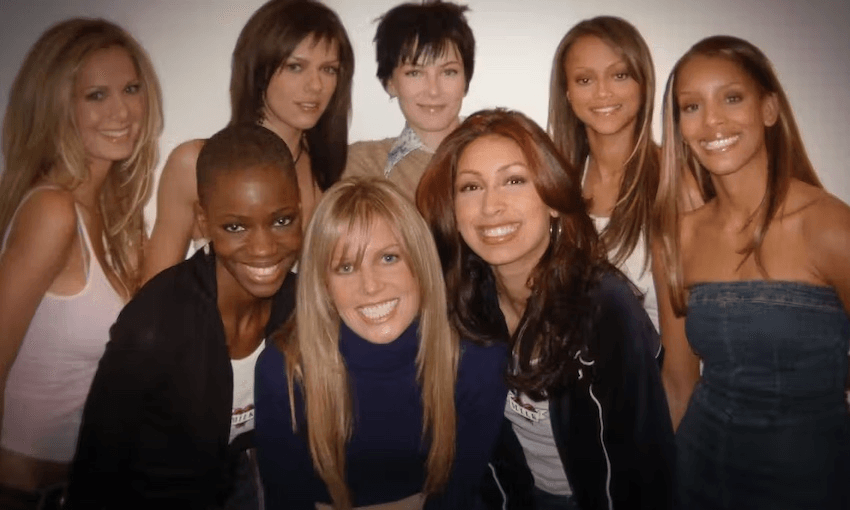Anika Moa’s new show Anika Moa: Unleashed launches today at midday on TVNZOnDemand with an interview with National deputy leader Paula Bennett. It’s a perfect showcase for two strong personalities, writes Sam Brooks.
Anika Moa is one of the greatest interviewers in our country, and she does it in the skin of an internet troll. She also makes very, very good TV, as her previous show All Talk With Anika Moa proved. Moa has a knack for getting people to let their guards down, usually by proving that she has no guard herself. She wants to take the piss out of people and build them up in equal measure. She’s our own Marc Maron, except she’s not boring as hell.
About two minutes into her interview with Paula Bennett on her new show Anika Moa: Unleashed, she asks if she can call Paula ‘Paula Benefit’, then rolls on by asking if she can call her ‘DPB’ or ‘Paula Dole’. It’s a moment of TV that feels instantly iconic, and I can guarantee you it’ll be edited into clickbait-ready videos before noon – not least because Anika Moa not only feels like she can ask it, she knows that her interviewee will play ball.
The first time I encountered Paula Bennett as anything more than a news clip or a political talking head was at The Spinoff’s pre-election debate last year. Regardless of my politics, which I will politely are almost diametrically opposed to hers, Bennett came out as the ‘winner’ on that night for me. She articulated her positions, she was charming and funny, and had a gift for building up a compelling position while yanking strongly at the threads of everybody else’s weaker arguments. Paula and I might have little to agree upon politically, but I came away from that debate wanting to have a Waitakere Daiquiri or five with her.
And to her credit, Paula Bennett always plays ball. Bennett is a savvy choice for Anika Moa’s first guest – you know she can laugh at herself given how she’s endorsed Tom Sainsbury’s antics (the show even starts with a phonecall to Sainsbury, proving that he’s the Tina Fey to Paula’s Sarah Palin) and you know that she has a very clear idea of what role she fulfills within her own party and the current media landscape. But you also know that Bennett will push back if you go past what she’s comfortable with. She’s guaranteed good content, so long as you’ve got an interviewer who knows what to do with her.
And Anika Moa has done her research, she’s holding the receipts, and she intends to call them in. She even shows up in a red dress! That doesn’t mean it’s a hard-hitting interview – Anika Moa is no Kim Hill and she has no intention of getting in the ring with Paula Bennett, as exhilarating that might be. But her interviewing style means she’s willing and able to call Bennett on some of the more politically lazy things she says (when asked how to sum up the difference between Labour and National in one word, she says “ambition” and Anika Moa’s laugh is the closest a laugh gets to saying “bullshit”) while still keeping the interview enjoyable. Regardless of where we stand on Bennett, she’s not someone you necessarily want to see skewered. And Moa doesn’t skewer; she lightly roasts and grills, and she tests the heat with her own hand first. (She ends the episode walking away in a Team Key t-shirt, saying she’s been converted, so you know she’s not afraid to laugh at herself.)
Moa’s style also leads to some bizarre moments. She’s so unguarded as a human being, or at least as an interviewer, that she nudges whoever she’s talking to into the same state. You wouldn’t get Kim Hill asking who Paula Bennett would go for if she was into women, and this also means that you wouldn’t get Paula Bennett admitting/joking that she would top Anika Moa. (The actual phrasing she uses is “top bitch”, which is simultaneously less explicit but far more explicit to a different section of society.) Anika Moa, who is never going to be outplayed or out-vulgared by anybody, proudly says she is a bottom. I, for one, am happy to see our national tax-payer funded broadcaster finally airing the specificities of a homosexual top/bottom relationship, but it remains a deeply strange moment when the deputy leader of our right-leaning political party is one of the people involved in those specifics.
Even when it’s weird, there are moments of vulnerability and honesty that only Anika Moa could get to. When she mentions John Tamihere calling Bennett “that bloody fat girl”, there’s a split second when you think it’s a horrible set-up or a call for a Barbara Walters moment, but then Moa goes, “fuck John Tamihere”. It levels the playing field a bit, and you can feel Bennett drop her guard. Next minute she’s talking frankly about her recent gastric bypass surgery and what she thinks of Jacinda Ardern, which leads to the most polite bit of shade I’ve recently heard from a politician: “She’s interested in a life that’s bigger than just politics.”
It’s an incredibly clever move to get Paula Bennett as a first episode guest. She’s a well-known and controversial figure, and she’s managed to be both of these things without ever experiencing the outright hatred that someone like Judith Collins has. Even in the moments where I felt uncomfortable laughing and smiling along with her – early on the interview she joyfully laughs at how she changed her anti-establishment ways, with the kind of steeliness I’d expect from a circa-mid-90s Glenn Close performance – I still wanted to see more of her.
She’s charming and funny – not like a comedian is (ie not at all), but like your favourite aunt after two or four pinot grigios. She’s funny because she knows it’s funny that someone like her would say this, that someone like her would make that face about the Greens, and that someone like her would joyously yell “two ticks blue!”. She knows her role and plays it better than anybody else can, and to see her do it, even in the context of an interview, is both fascinating and terrifying.
There’s a requisite silly bit revolving around Moa pretending to be a recently elected Bennett back in 2005 talking to a current-day Bennett. It doesn’t quite work though both sides gamely commit to it – along with an awkward joke that she’s slowly poisoning Simon Bridges – but other than that stumble, Anika Moa Unleashed is an unqualified success, and I hope it becomes a core part of TVNZ OnDemand’s schedule.
After only ten minutes, I came away from the Bennett interview with a deep curiosity for her as both person and politician. If Moa can keep this up with the rest of her guests (the First Husband himself Clarke Gayford, Tuhoe activist Tame Iti and famous winemaker Sam Neill) then she’ll have a genuine hit on her hands. Not just for the clickbait-y, easily headlined quotes, but for conversations that are genuine, funny and humane.
Anika Moa: Unleashed launches today at midday on TVNZOnDemand



